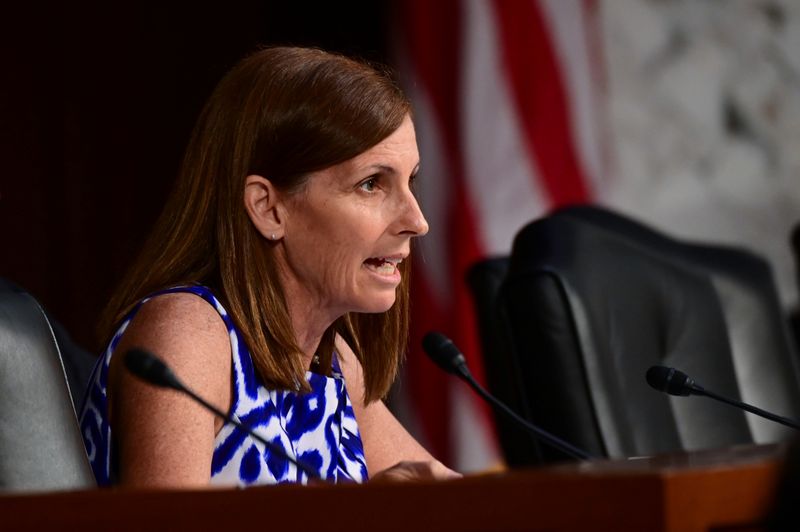(Reuters) - President Donald Trump's slumping opinion poll numbers over his response to the coronavirus pandemic are also weighing on his fellow Republicans' chances of holding onto their 53-47 majority in the U.S. Senate.
Democrats would need to win at least three Republican-held seats for a majority, if Democrat Joe Biden wins the White House, giving his running mate Kamala Harris a tie-breaking Senate vote, or four seats if Biden loses.
Here is a look at seven races where Senate Republican incumbents are locked in highly competitive contests against Democratic challengers, and two where Democrats are on the ropes:
Vulnerable Republicans:
ARIZONA
Republican Senator Martha McSally lags Democratic challenger Mark Kelly in fundraising and trails him by an average of just over 11 percentage points in opinion polls, according to the campaign tracking website RealClearPolitics.com.
McSally, a former U.S. representative and U.S. Air Force combat pilot, was appointed to the seat once held by the late Republican Senator John McCain after losing her 2018 Senate bid to Democrat Kyrsten Sinema. Kelly, a former astronaut and U.S. Navy combat pilot, has been leading McSally in opinion polls for more than a year.
COLORADO
Republican Senator Cory Gardner, a former U.S. representative who entered the Senate in 2015, is now among the most vulnerable Senate Republicans partly because of his allegiance to Trump, in a state that has gone Democratic in the last three presidential elections.
Democrat John Hickenlooper, a former two-term governor and 2020 presidential hopeful, is leading Gardner in opinion polls. But Gardner holds a sizeable cash advantage and the Democrat's polling lead has slipped from double digits in July to just 5 percentage points, according to FiveThirtyEight.com, raising the chances that Gardner could pull through.
GEORGIA
First-term Republican Senator David Perdue, a wealthy businessman who promotes himself as a Trump ally, leads Democratic challenger Jon Ossoff by an average of 4 percentage points in opinion polls, according to RealClearPolitics.com. He also holds a fundraising advantage.
Ossoff, an investigative journalist and media executive, ran a powerful campaign for a U.S. House of Representatives special election in 2017 but ultimately lost. Democrats believe he could oust Perdue, partly as a result of public disaffection for Trump's response to the COVID-19 pandemic that has hit Georgia hard.
IOWA
Democrat Theresa Greenfield, an urban planner and real estate developer, is running neck-and-neck against Republican Senator Joni Ernst at a time when Iowa is experiencing a spike in coronavirus infections.
Greenfield has accused Ernst of being a rubber stamp for Trump and not taking the COVID-19 pandemic seriously enough at a time when coronavirus infections are rising in the state. Ernst, a first-term U.S. senator with a cash advantage over her opponent, labels Greenfield as hostile to police and says her campaign is bankrolled by out-of-state liberals.
MAINE
Four-term Republican Senator Susan Collins, a New England moderate long known for her independence, has seen her popularity flag among voters amid criticism that she has failed to be a moderating force in the Senate during Trump's presidency.
Her Democratic challenger, Maine House of Representatives Speaker Sara Gideon, has led Collins by several points for months in opinion polls and has out-fundraised the Republican. But a recent poll by AARP, an advocacy group for older Americans, suggests the race could be tightening, showing Gideon ahead by only a single percentage point.
MONTANA
Republican Senator Steve Daines faces a tight re-election bid against two-term Governor Steve Bullock, a former presidential candidate who has branded himself as an independent-minded Democrat. Daines, a former congressman and software executive, is known as a reliable conservative and has touted his ties to Trump.
Bullock was a late entry, jumping into the race in March. But he managed to raise more than $11 million quickly, nearly matching Daines' fundraising since the election cycle began in January 2019. The Democrat led Daines in opinion polls into the summer. But the Republican currently leads Bullock by about 3 percentage points, according to FiveThirtyEight.com.
NORTH CAROLINA
Republican Senator Thom Tillis trails his Democratic challenger, former state Senator Cal Cunningham, who has also steadily outraised him in campaign donations, though the two contenders each entered the summer with cash positions of more than $6 million.
Despite a longstanding Cunningham lead in the polls, analysts say the election is likely to be determined by Trump's performance in the state, which has been hit hard by the pandemic. Recent polling sponsored by AARP shows Trump tied with Biden.
Vulnerable Democrats:
ALABAMA
Senator Doug Jones, considered the most vulnerable Democrat in the Senate, won election to the seat that Republican Jeff Sessions vacated to become Trump's attorney general in 2017. In a state normally considered safe for Republican candidates, Jones bested former Alabama Supreme Court Chief Justice Roy Moore, whose campaign was snarled by allegations of sexual misconduct.
The Democrat now faces former Auburn University football coach Tommy Tuberville, a Republican who defeated Sessions' attempted comeback earlier this year. Recent polls show Tuberville leading Jones by double digits.
MICHIGAN
Democratic Senator Gary Peters holds a small lead over Republican challenger John James in a state that represents a major battleground in Trump's re-election bid.

The race leans in Peters' direction, according to analysts. But James, a Michigan businessman, has been outraising the Democrat in campaign donations, though Peters reported a larger amount of cash on hand over the summer.